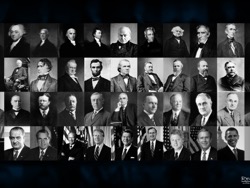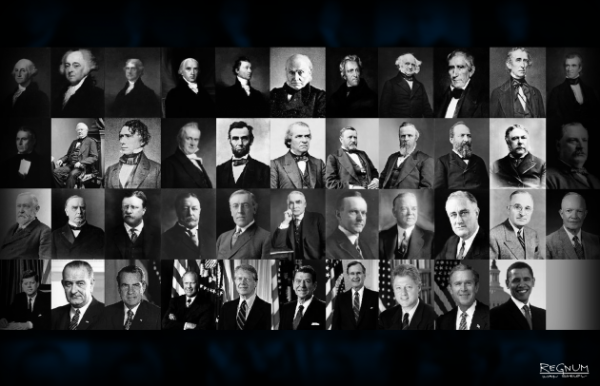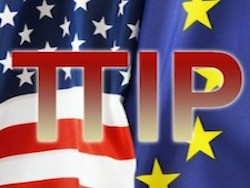
TRANS-Pacific trade partnership (TPP) and Transatlantic trade and investment partnership (TTIP) is able to change the principles and norms of international law in the near future, in the future, where institutions such as the UN, WTO, world Bank and IMF, will lose their value. Many analysts link the emergence of the New development Bank created by BRICS and Asian infrastructure investment Bank led by China.
TRANS-Pacific trade partnership, the Huffington post recently dubbed the “economic NATO”. But in 2012 the U.S. Secretary of state Hillary Clinton, speaking for the Transatlantic trade agreement, which was to contribute to the creation of new jobs, called it the “economic NATO”, designed to recreate the ties between the old allies. Three years later, the presidential candidate of the Democrats is showing less enthusiasm about the organization.
“TTIP in the U.S. was overshadowed by his Pacific colleagues, the TRANS-Pacific partnership (TPP). Skeptics who fear the effect of both contracts on American jobs, include and progressive Democrats, and the tea party, and the protectionists, and the trade unions.
Speaking about the geopolitical benefits, the advocates of the Treaty mention free trade, which can breathe new life into the Alliance and set benchmarks that would China and other emerging powers would be unable to ignore in future trade deals. The international propaganda machine of Russia would also be concerned about the potential for strengthening transatlantic relations”, — assured the journalists of Politico.
“Unlike traditional free trade agreements, it is not about reducing tariffs and duties. They are already low — an average of just 3%. TTIP focuses on removing “non-tariff barriers” — the harmonization of standards, de-bureaucratization and increasing safeguards for investors that will make trading simpler and cheaper, and exporters will not need to adapt to the dual set of rules.
Most of the public afraid of the empowerment of multinational companies at the expense of parliaments and citizens, in particular, using the so-called provisions on “dispute settlement” (ISDS) which allows corporations to challenge national laws in private courts of arbitration… But both parties hope that the “deal” should be signed off before leaving the Obama administration in January 2017″, — the newspaper writes Politico.
Britain concerned about the danger of privatization of the system of national health, housing and other public services of major American corporations. Germany and France are the differences in employment legislation since the USA where are only two of the eight core standards of the EU. The Europeans fear that this will lead to a conclusion of production to other countries, with lower social costs, and rising unemployment.
USA consider such problems minor and that you can agree on then. It is important to understand that common law is precedential in nature, and after signing an agreement in principle, while the European Parliament will argue every clause, American courts will make decisions that later will be impossible to ignore.
TTIP will regulate the whole complex of trading relations, including monetary policy, investment and legal practice, questions of trade secrets and counterfeit goods, information services, education, medicine, security and interstate cooperation.
Europeans fear the reduction of sanitary and environmental regulations: handling chlorine, hormones and antibiotics meat; genetically modified grain for sowing the fields; the shock of mechanisms for the protection of national culture — quota audiovisual production in France, for instance; and the so-called “hostile takeovers” of strategic sectors of the European economy with the proceedings beyond the control of the Europeans courts of arbitration. The U.S. is interested in TTIP because of access to a huge market, which they will impose conditions.
In October last year in Berlin to demonstrate against the TTIP has left more than 150 thousand people, which became the largest protest since the performance of the Germans against the war in Iraq in 2003.
As Pacific partnership, trade Ministers of the Pacific from Australia, Brunei, Canada, Chile, Japan, Malaysia, Mexico, New Zealand, Peru, Singapore, USA and Vietnam on 5 October 2015 signed a contract that covers a wide range of areas: from pharmaceuticals and banking to the conditions of sale of milk. The Treaty have to ratify each of the TPP countries. The notable exception to “Covenant” is China. But for anybody not a secret that, in particular, the agreement aims to end with the domination of China in the region.
“Hypocritical America that defending freedom of trade, refuses to eliminate agricultural subsidies, instead of holding the global trade negotiations with Europe have adopted the strategy of “divide and conquer”, based on partially overlapping trading blocs and agreements,” denounces the policy of the US edition of Project Syndicate.
“As a result, the intended place of the global free trade regime occurs controversial regime of managed trade. In most parts of the Pacific and Atlantic regions of trade will govern the agreement, occupying thousands of pages of crowded and complex rules, whose nature is contrary to the basic principles of efficiency free exchange of goods.
TRANS-Pacific partnership (TPP) is also facing a tough battle for ratification, as the leading presidential candidates from the Democratic party and many Republicans oppose it. The problem is not so much described in the agreement, the terms of trade, but in its “investment” Chapter. It significantly limits the possibilities of state regulation in the field of environmental, health and safety and even limits financial regulation.
The Treaty will provoke costly lawsuits, in which powerful corporations will face poorly funded governments. Even regulation, protecting the planet from greenhouse gas emissions, is under threat. The only regulation that seems to have nothing to fear, with cigarettes (claims filed against Uruguay and Australia with the requirement to make less harsh labels about the risks of Smoking to health, have already attracted a lot of attention). However, there remains plenty of questions about the possibility of lawsuits in other areas.
The point about “most favored nation status” ensures that the Corporation can require the best conditions in any of the Treaty countries. Thus given the start of the competitive race of deregulation — something completely opposite of what was promised by President Barack Obama.
He has repeatedly stated that the TTP will allow you to determine who is America, or China, would be to write trade rules for the twenty-first century. The correct approach would be collective and transparent development of these rules (when all voices heard). Obama is trying to perpetuate the usual style of doing things, when the rules governing global trade and investment, written by U.S. corporations to U.S. corporations”, — writes the edition Project Syndicate.
Among those who opposed the agreement, the trade unions, the environmental groups who still, paradoxically, by tradition, are supporters of Obama. Many in his own party of the President — including Senator Bernie Sanders is opposed to trade agreements. Sanders, in particular, said he was “disappointed but not surprised by the decision on the promotion of disastrous trade agreements, which will harm consumers and will cost America jobs.” “Wall street and big corporations win again. It is time to stop multinational corporations and allow them to inflate their profits at our expense”, he said. He likened the agreement with the failed trade deals with Mexico and China that cost the US millions of jobs in the past.
The Corporation is clearly lobbying “passage” of the deal. Large companies, such as Nike, of course, support the agreement. At the moment 98% of shoes in the U.S. is imported. Analysis of data from the Federal election Commission showed that members of the U.S. business coalition donated more than $1 million for members of the U.S. Senate from January to March this year, during the discussion of TTP. According to The Guardian, from the General Fund $1 148 971 an average of $17,676.48 was “awarded” for each of the 65 votes in favor. The voices of Republicans were rewarded supporters of the TPP in the amount of $19,673.28. The average Democrat received $9689,23 from the same “donor”.
Although the agreement was secret, Obama insisted that the Treaty was not secret. “Any agreement we make with one of 11 countries, should be and will be posted online at least 60 days before I sign them. You must still pass the Congress — and you know they’re not going to do anything quickly. So will be months for review,” Obama said.
“We ask the administration to immediately publish a text and call on lawmakers to exercise great care in the evaluation of TTP,” says Richard Tramka, President of the largest Union Federation in the U.S. AFL-CIO.
“Of course, to support trade agreements have found a reason and a “considerable” economic. TTP supporters emphasize his foreign policy significance, especially as one of the most important means to restore the balance in Asia.
Recently a survey was conducted about how the free trade agreement affect the achievement of the objectives of United States foreign policy. Such agreements were deemed “effective” in 64% of the respondents, and 34% regarded them as “ineffective”. It is interesting a sharp partisan difference. Democrats are much more enthusiastic about the effectiveness of foreign policy (77% and 22% — against), than Republicans (56% and 42%).
This may be particularly difficult point in the electoral campaign of the presidential candidate from the Democrats Hillary Clinton. Her campaign, in particular, is built on the ability to “well-versed in foreign Affairs”. As Secretary of state, she publicly supported TTP 45 times. In October last year, before the text of the TTP was released, it stated its disapproval of the TPP. This puts her in an uncomfortable position and contrary to public opinion, which is reflected in a broad overview. Richard Tramka, President of the AFL-CIO, however, says that this position required Clinton to earn the support of the unions that TTP don’t like.
The approach of U.S. President Barack Obama to lobby for trade agreements is also very interesting. Opponents of free trade agreements, he tried to explain the importance of the TPP, arguing that it is radically different from previous…
The problem with the ratification may occur because of weak support among congressional Democrats, means that the agreement is in the hands of the Republicans. If the US leadership in trade negotiations drew attention to the prospects of the TPP could be clearer. The white house “trumpeted” on TPP as “the most progressive trade agreement in history”, rejecting claims by the Chairman of the Finance Commission for the protection of intellectual property, and others, such as tobacco investments. Of course, if support for TPP in Congress was as wide as among the American public, such objections would not have mattered.
It is unlikely that the number of congressmen-Democrats, supporting TTP, will increase — especially before elections. This would mean support of Republicans. Can the Republican Congress to actually confront the TTP, given that even respondents-Republicans support the agreement?
It makes very interesting the fact that, most likely, broad support among Republicans provide most of the TTP and ratification, and will bring “victory” for Obama at the end of this spring,” writes Foreign Policy.








